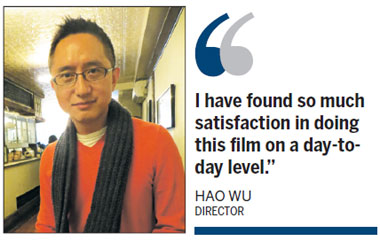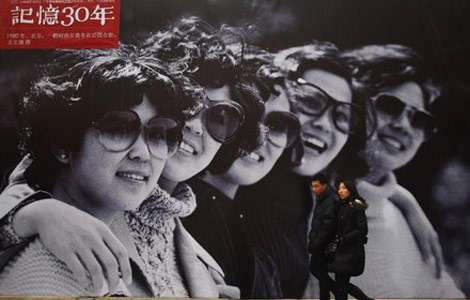Filmmaker seeks better coverage
Updated: 2013-11-15 13:16
By Caroline Berg in New York (China Daily USA)
|
||||||||

China's burgeoning movie market may be second only to Hollywood, but the documentary genre remains an elusive component on its silver screens. Nevertheless, many filmmakers feel a sense of duty to document China's multifaceted modern culture.
"There are some wonderful documentary films coming out of China, but for some reason or another, it's all pretty negative to China," Hao Wu, director of the coming-of-age documentary The Road to Fame, told China Daily.
"Documentaries about China tend to be either about Chinese people living in repressed conditions or it's about poverty and migrants," Wu said. "These are all worthy issues, but I think that doesn't represent the whole picture about China."
The filmmaker said he felt China's urban youth is underrepresented in the genre, and after his first documentary about six Chinese Americans living in China called Beijing or Bust (2005), Wu began his second project with The Road to Fame, which chronicles China's first official collaboration with Broadway in 2008.
"I want to show China is more complicated, and there are many perspectives to consider," Wu said. "More importantly, I want to show people in China are not that different from, say, those in the US."
Wu's film follows the eight-month course when 31 students from China's top drama academy, the Central Academy of Drama in Beijing, worked with three US directors on a Chinese version of the musical Fame - a story about the pursuit of stardom, which parallels the real Chinese actors' lives.
The Road to Fame will have its New York premiere on Saturday, at 7:15 pm at the IFC Center in New York. The documentary is one of 132 short and feature length films lined up for the fourth annual "Doc NYC" nonfiction cinema festival.
The film had its world premiere in June at the Sheffield Doc/Fest 2013 in England and is now on a film festival run. The film had its Asia premiere in September at the CNEX Documentary Film Festival in Taiwan, then the Hawaii International Film Festival, the DMZ Korean International Documentary Film Festival, and after the New York premiere, the film will be screened at the St. Louis International Film Festival in Missouri on Sunday.
"Originally, I thought I'd use this film to tell people outside of China what Chinese youth are like and what they're going through," said Wu, who grew up in Chengdu, China, and now lives in Harlem, New York. "I didn't realize this documentary would really resonate with the young people inside of China."
Students in the film discussed the immense pressure they feel to live up to the expectations of their parents, particularly as a generation born under the One Child Policy, and not to mention the odds of succeeding as one of 240 million children born under this policy.
"We're definitely seeing an exciting time in China in terms of performing arts, but in terms of whether the kids are ready [for stardom] is another thing," Wu said. "Performing arts education in China is a booming industry, but the system still needs to become more and more mature."
The Central Academy of Drama accepts less than one percent of its roughly 10,000 applicants, and industry estimates of the number of actors in Beijing run between 300,000 to 400,000, according to the documentary. Despite its top-tier reputation with famous graduates like actresses Gong Li and Zhang Ziyi, a degree from the academy no longer guarantees a job.
After documenting the China-Broadway collaboration, Wu reconnected with a group of the students in 2012 for a "where are they now?" reflection. Most were managing modest careers in show business, but only time will tell if any will achieve the glory they dreamed of in 2008.
Wu said he hopes not only to get his film distributed in cinemas in China, but also to encourage Chinese people to value the documentary genre more.
"So far, very few documentaries have been distributed theatrically in China," Wu said. "So I want to contribute my share and really educate the audience that you can go to the theater and watch a good documentary."
Wu isn't the only one looking to document a more well- rounded view of modern China. CNEX, short for "China Next," is a nonprofit organization that finances Chinese documentaries, and organizes film screenings on college campuses around China, as well as an annual film festival in Taiwan.
Originally, the chief executive of CNEX, Ben Tsiang, thought about making a comprehensive documentary about contemporary China that included the extravagant nouveau riche culture, the bitter lives of migrant workers and the society's confused values, according to an August New York Times article.
However, Tsiang realized that one film wouldn't do justice to China's complicated modern story, and so he and two other Taiwanese film buffs decided it would take creating a film industry to document what is happening in China, the Times said.
CNEX aims to create 100 films over 10 years, and has helped support a number of critically successful documentaries, including the Du Haibin's award-winning 1428 about the aftermath of the tragic 2008 Sichuan earthquake, the report said.
As for Wu, he's already researching his next project, which will be something about the complexity of China, he said.
"I have found so much satisfaction in doing this film on a day-to-day level," said Wu, who quit his job with Tripadvisor to focus on documentary filmmaking. "I still feel there is a lack of understanding of China. It's disappearing, but not fast enough. There's so much distrust between the two countries. I feel like that's the area where I can add value. That's much better than me doing other stuff."
carolineberg@chinadailyusa.com
(China Daily USA 11/15/2013 page11)

 US carrier starts Philippine storm relief
US carrier starts Philippine storm relief
 Treasures under the hammer
Treasures under the hammer
 'Reverse' vending machine sells idea of recycling
'Reverse' vending machine sells idea of recycling
 Heroic act helps thaw icy ties
Heroic act helps thaw icy ties
 Newtown families mark anniversary with a plea for parents to unite
Newtown families mark anniversary with a plea for parents to unite
 China's changing fashion since 1978
China's changing fashion since 1978
 Healthy baby born to brain-dead mom in Hungary
Healthy baby born to brain-dead mom in Hungary
 Top 10 romantic places to meet your Miss Right
Top 10 romantic places to meet your Miss Right
Most Viewed
Editor's Picks

|

|

|

|

|

|
Today's Top News
CCNY to occupy US's tallest building
US treasury chief makes 2nd trip to China
Nobel prize winner's connections with China
Canada should think globally: official
 CCA buys on Hudson riverfront
CCA buys on Hudson riverfront
US spying agencies out of control
Yancoal strides into the potash game
Green chance offered to investors
US Weekly

|

|







